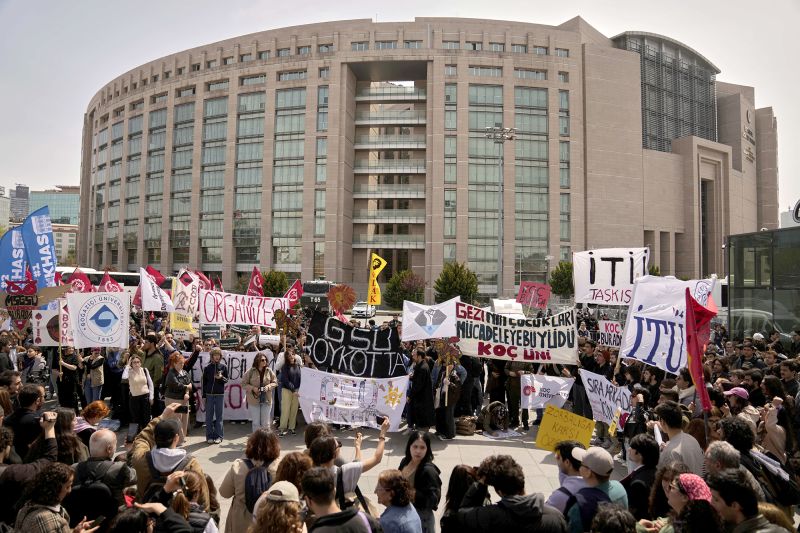Turkey started hastily organized mass trials on Friday to prosecute some of the hundreds of people who took part in the widespread demonstrations over the jailing of Istanbul’s mayor Ekrem Imamoglu, the major rival to President Recep Tayyip Erdogan.
Some 189 people, including journalists, students and activists, were on trial across two overflowing court rooms in Istanbul’s Caglayan justice palace, one of the city’s main courts.
Both courts ruled to split the list of defendants to more manageable numbers after hearing procedural motions by defense lawyers.
Charges against the defendants stem from the protests that erupted after Imamoglu’s arrest on March 19 on corruption allegations — a move critics see as an attempt to sideline a key rival to Erdogan ahead of elections expected to be held in 2028.
At least 1,400 people were arrested during the demonstrations, posing one of the biggest challenges yet to the long rule of Erdogan, who is seeking to extend his presidency.
Human Rights Watch (HRW) condemned the trials as politically motivated, citing a lack of evidence and calling the charges incompatible with democratic norms.
A small group of parents and supporters gathered outside the court before the trials to demand justice for students who are among those being prosecuted, holding signs, releasing balloons and chanting “we want justice for our kids.”
“We release these balloons to symbolize their right to freely express themselves, their right to education, and their right to lead free lives,” the group said in a statement.
Eight journalists who were arrested while covering the protests in Istanbul also appeared in court on Friday.
One defense lawyer called for the immediate dismissal of the case and told the court, “The journalists were carrying out their constitutionally protected jobs.”
HRW reviewed the indictments against 650 demonstrators “accused of protest-related offenses,” noting that 120 were charged for assemblies held after an eight-day protest ban expired.
Potential sentences range from six months to five years, yet in some cases the evidence appeared thin. In one case, a rock allegedly held by a protester was cited as a weapon.
Protesters in the capital Ankara were met with police water cannons. In Istanbul, police doused people with pepper spray, and some officers kicked and hit demonstrators after several fireworks and other objects were thrown at riot police near the city’s municipality building, according to Reuters.
Hugh Williamson, HRW’s Europe director, criticized the trials as “a warning against exercising the rights to peaceful protest or free expression,” and urged prosecutors to drop charges without concrete evidence.
Turkey’s record on assembly rights has long drawn scrutiny, with the European Court of Human Rights (ECHR) issuing over 70 rulings against Ankara since 2010 for disproportionate crackdowns, HRW said.
The Council of Europe has called on Turkey to protect “the right to peaceful protest.”
“The presumption of innocence, the use of pre-trial detention strictly as a measure of last resort and the protection of political expression” must all be guaranteed, the Council said.
Despite this, Erdogan’s government has tightened control, with Freedom House, a US-based nonprofit research organization, labeling Turkey “not free” amid censorship and surveillance laws.
As the trials begin, observers have warned of deepening authoritarianism. With 90% of Turkish media under government influence and journalists routinely targeted, the cases underscore a broader erosion of rights under Erdogan, who has ruled since 2003 and could remain in power until 2029.
Elections are not scheduled until 2028 but would need to come earlier if Erdogan, 71, who has run Turkey for 22 years, wants to run again. Imamoglu leads the president in some polls.
